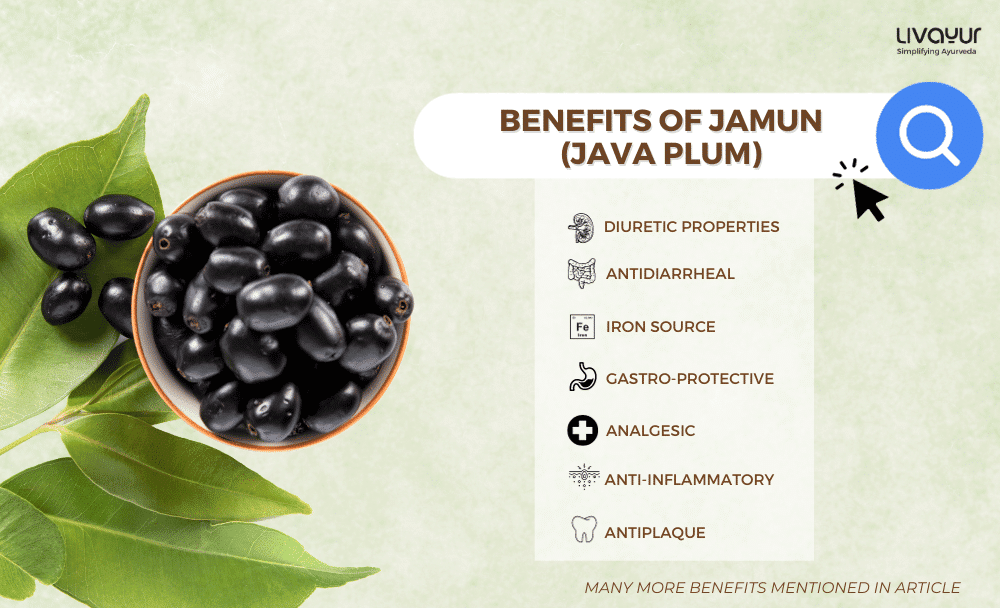
Have you seen those succulent, purplish black berries hanging from the branches of the mighty Jamun tree? Well, that fruit is called the java plum or jamun. It stands out as a true jewel in the world of Ayurveda.
When we talk of traditional Ayurvedic medicines, the intrinsic connection between nature and human well-being is a given. Among nature’s many natural treasures, the java plum, scientifically known as Syzygium cumini is one.
This unassuming fruit, native to the Indian subcontinent, has long been distinguished in Ayurvedic healing practices due to its profound impact on holistic health. The present article delves into this amazing fruit, unraveling its 12 remarkable java plum benefits for health.
What is a java plum (jamun)?
Jamun, scientifically classified as Syzygium cumini (Linn) Skeeels, is a botanical gem renowned for its seasonal and perishable berries. These are commonly referred to as java plum in English or jambul. Belonging to the Myrtles family, Myrtaceae, the jamun tree is an evergreen plant that can reach heights of up to 30 meters and boasts a circumference of approximately 3.6 meters.
This remarkable tree thrives in tropical and subtropical regions of India and across the Indian Subcontinent. Its distribution extends to other areas, including Sri Lanka, Malaysia, Bangladesh, and Australia. The jamun fruit has an oval shape, initially green in color during its immature stage, transforming into a rich crimson black as it ripens.
Notably, the seed within the fruit constitutes about 25% of its total weight, while the fruit pulp and peel collectively account for the remaining 75%. When fully ripe, Jamun fruits are juicy and devoid of discernible odor. [1]
Nutritional Value of Java plums (100 grams)
| Nutrients | Value |
| Calories | 60 kcal |
| Carbohydrates | 15.56 Grams |
| Protein | 0.72 Grams |
| Fat | 0.23 Grams |
| Water | 83.13 Grams |
| Potassium | 79 mg |
| Sodium | 14 mg |
| Phosphorus | 17 mg |
| Calcium | 19 mg |
| Iron | 0.19 mg |
| Magnesium | 15 mg |
| Vitamin A | 3 IU |
| Vitamin B6 | 0.038 mg |
| Vitamin C | 14.3 mg |
| Thiamine | 0.006 mg |
| Riboflavin | 0.012 mg |
| Niacin | 0.260 mg |
| Pantothenic Acid | 0.160 mg |
Source: Researcgate.net
Type of Plums
Java plums or Indian BlackBerry is not the only plum category available in India. Various other types of plums or cultivars grow in India. Let’s have a look:
- Pewandi
- Banarasi
- Dandan
- Kaithli
- Narikelee
- Umran
- Nazuk
- Muria Maharara
Ayurvedic Classification of jamun/jambu or java plum are:
- Ksudra Jambu
- Raja Jambu
- Maha Jambu
- Kaka Jambu
- Bhumi Jambu
12 Incredible health benefits of Java Plum
Here are 12 ways your health can benefit from consuming jamun.
1. Rich in phyto-constituents
Jamun has diverse phytochemicals, including tannins, alkaloids, and flavonoids, which enhance its therapeutic potential. [2]
2. Comes with Hypoglycemic effect
Jamun has hypoglycemic properties, making it a valuable addition to the diet for individuals seeking to manage blood sugar levels effectively. [2]
3. Comes with Diuretic properties
The diuretic nature of jamun promotes healthy kidney function, aiding in the efficient elimination of waste and excess fluids from the body. [2]
4. Acts as an Analgesic
Jamun exhibits analgesic qualities, relieving various types of pain and discomfort. [2]
5. Is Anti-inflammatory in nature
Its anti-inflammatory attributes help alleviate inflammation and associated symptoms, contributing to overall well-being. [2]
6. Comes with Antiplaque capabilities
Jamun is known for its antiplaque properties, which can support oral health by reducing plaque buildup and preventing dental issues. [2]
7. Antimicrobial in nature
The fruit’s antimicrobial characteristics effectively inhibit the growth of harmful microorganisms within the body. [2]
8. Antidiarrheal in action
Jamun’s antidiarrheal properties can help manage and alleviate diarrhea, offering digestive relief. [2]
9. Rich in Antioxidants
Loaded with antioxidants, jamun helps combat free radicals and oxidative stress, promoting cellular health and reducing the risk of chronic diseases. [2]
10. Comes with Gastro-protective attributes
Jamun has a gastro-protective effect, which can help soothe the digestive tract and mitigate gastric discomfort. [2]
11. Has remarkable Astringency
The natural astringency of jamun fruit aids in tightening and toning tissues, potentially benefiting various bodily functions. [2]
12. Is a rich iron source
Jamun is a good source of iron, making it a valuable dietary component for individuals aiming to maintain healthy iron levels, which is crucial for overall vitality. [2]
Other medicinal uses of java plum
In Ayurveda, Jamun or java plum is a much-valued fruit because of its many therapeutic applications. Apart from the health benefits mentioned above, java plum or jamun may have many other medicinal uses as mentioned below:
- Balances Pitta and Kapha Dosha
- Ideal as a detox fruit
- Stomach pain management
- Treats anorexia
- Effective in the case of worm infestation
- Cures throat ache
Also read our blogs on how to pacify pitta dosha and kapha dosha
How to consume java plum (jamun)?
Consuming java plum, or jamun, can be a delightful and health-enhancing experience when done with care and consideration. Before consumption, wash the Jamun fruits thoroughly under running water to remove dirt and contaminants. Jamun seeds can be relatively large and may affect the overall eating experience. To enjoy the fruit without interruption, consider removing the seeds by cutting the fruit into slices or using a spoon to scoop out the pulp. Here are some easy ways to consume jamun.
1. Fresh and ripe
Choose fresh and fully ripe jamun fruits. The ripe fruits have a deep, crimson-black color. They are also sweet with a slightly tangy taste and are softer to the touch. Avoid unripe or overripe fruits, which may not offer the best flavor or nutritional value.
2. Jamun juice
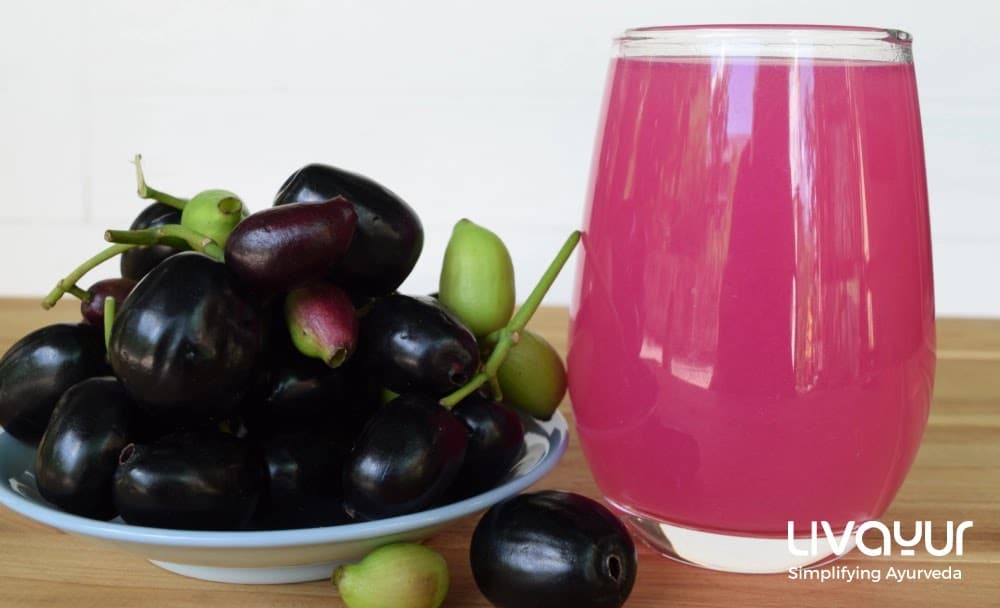
To make jamun juice, blend the ripe fruit with water and strain the mixture to remove seeds and residue. You can consume the resulting juice directly or as a base for refreshing beverages.
3. Jamun as an ingredient
Incorporate Jamun into various culinary preparations, like salads, chutneys, desserts, or jams. Its unique flavor and nutritional benefits can enhance your dishes’ taste and nutritional value.
4. Jamun supplements
If fresh Jamun is not readily available, you can also find Jamun supplements in capsules, powders, or syrups. They provide a convenient way to harness its health benefits.
Moderation aspect to keep in mind when consuming java plum (jamun)
While jamun is undeniably nutritious, you should consume it in moderation. Excessive intake may lead to digestive discomfort due to its astringent properties. If you have dietary restrictions and health concerns, consult a registered dietitian before incorporating jamun into your diet, especially if you intend to use it for therapeutic purposes.
Where to buy Java plums?
Java plum may be purchased from the local markets or from shopping malls or multipurpose stores.
If you are looking for an online option, you can buy java plum from:
- IndiaMART
- Blinkit
- Jiomart
- Desertcart
- Esty
- AK Fresh Mart
- Saphco
FAQs
1. What is the java plum tree?
The java plum tree (Syzygium cumini) is an evergreen plant. It can rise up to 30 meters and has a circumference of approximately 3.6 meters. It belongs to the Myrtaceae family and is native to tropical and subtropical regions, including India, Sri Lanka, Malaysia, Bangladesh, and Australia. The tree bears the iconic java plum fruit, known for its health benefits and culinary versatility.
2. What does a java plum fruit look like and how does it taste?
Java plum fruit is oval and initially green when unripe. As it ripens, it transforms into a deep, crimson-black color. The taste is sweet and slightly tangy. The fruit’s flesh is juicy and encloses a seed, which makes up about 25% of its total weight.
3. Are java plum leaves beneficial for health?
Java plum leaves have their own set of health benefits. They are known for their anti-diabetic properties and have been used traditionally to help manage blood sugar levels. Some people prepare jamun leaf extract or powder as a natural remedy for diabetes.[2]
4. Is Java plum helpful for pregnant women?
Java plum fruit benefits during pregnancy are many. Java plum is packed with nutrients which can help a pregnant woman stay healthy and b during the difficult phases of pregnancy. The fruit can boost your immune system effectively. Also, the fibre in Java plum improves the functioning of the digestive system and helps deal with pregnancy-related constipation. The Vitamin C content of Java plum improves the absorption of iron in your body, and iron is one of the most important minerals required during pregnancy.
5. How many calories are there in Java Plum?
Java Plum is relatively low in calories. A 100-gram serving of fresh, raw Jamun contains approximately 60 calories. The calorie value may change depending on the fruit’s ripeness and size. Java plum uses- java plum calories being pretty low, this juicy fruit may definitely help in weight management.
6. What are the medicinal properties of Java plum?
Java plum exhibits the following medicinal properties:
1. Diuretic in nature
2. Antimicrobial in nature
3. Cytotoxic in nature
4. Carminative in nature
5. Antiscorbutic in nature
6. Astringent in nature [3]
Conclusion
The synergy between Ayurveda and java plum, or jamun, has illuminated its exceptional contributions to holistic health. With its multifaceted benefits, ranging from blood sugar management and pain relief to its role as a versatile antioxidant, jamun rightfully claims its place as a treasured natural resource. As we navigate modern wellness, the ancient wisdom of Ayurveda continues to underscore the significance of embracing nature’s gifts. In the case of jamun, it highlights the timeless bond between tradition and science for pursuing optimal health.
Disclaimer
The information provided here does not intend to replace professional advice or treatment.




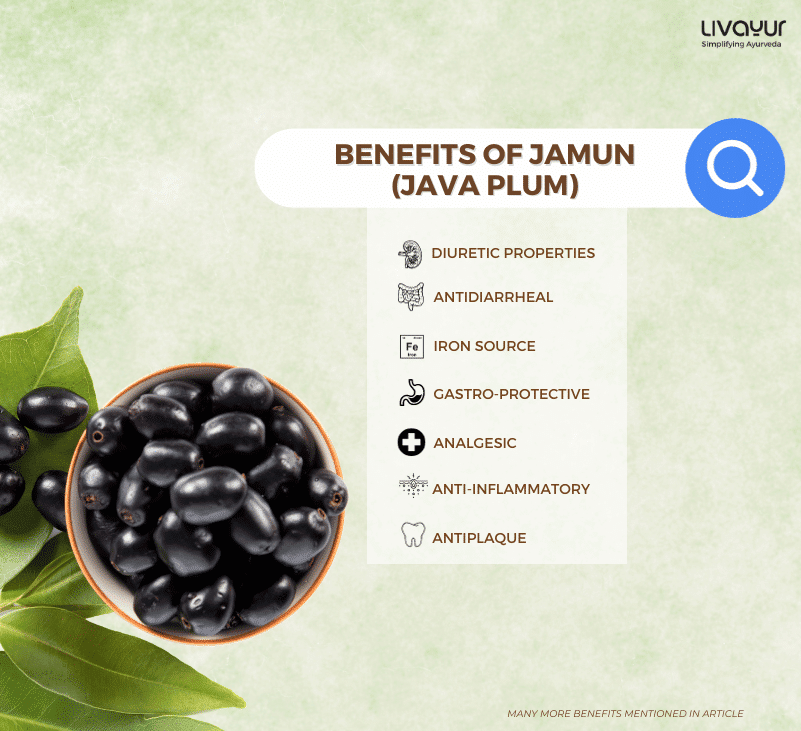











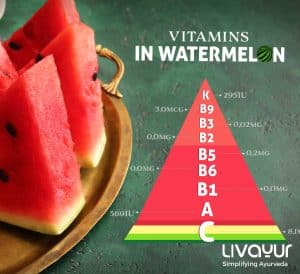

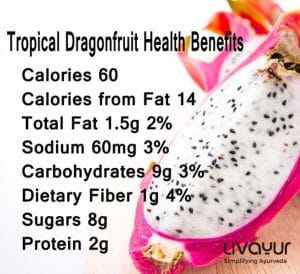






1 Comments